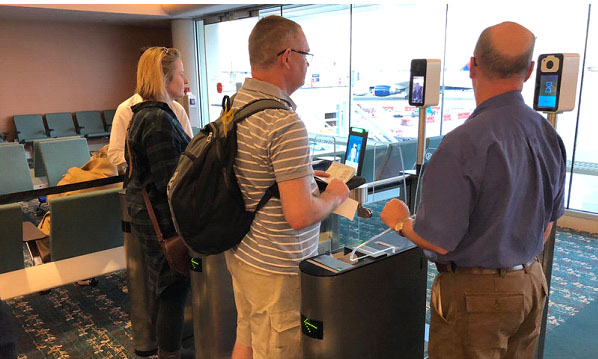Some passengers take a facial scan at an airport
More than 250,000 British Airways customers have experienced a glimpse of the journey of the future by using their face as their identity to board a flight from the US in the last 18 months.
The introduction of new biometric facial recognition technology has transformed the airport experience for customers travelling from Orlando, Los Angeles and New York, JFK by streamlining the boarding process and halving the amount of time it takes to board an aircraft.
The technology means that customers no longer need to present their passport or boarding pass at the departure gate – only when they check in and go through Security.
Instead travelers simply look into a camera prior to boarding, wait for their biometric data to be verified and then walk onto the aircraft.
The commitment to this technology is part of the airline’s £6.5bn investment for customers. British Airways was the first UK airline to use biometric technology to board flights from the US working in close partnership with the US Customs and Border Protection (CBP) to implement the technology, which has enabled the airline to hugely speed up its boarding process.
At Orlando, British Airways is boarding almost 240 customers in 10 minutes – becoming the first carrier to set up permanent facial recognition gates at the airport.
Heathrow
British Airways was also the first UK airline to use the technology on domestic (UK) flights. More than three million customers have boarded an aircraft this way – with all domestic departures from the airline’s home hub at Heathrow Terminal 5 now boarded biometrically.
For international flights, self-service boarding gates have now been installed at the terminal, allowing customers to scan their own boarding cards to gain access to their flight.
It’s the first step towards biometric boarding on international flights from the UK.
Investment in technology
Raoul Cooper, British Airways’ Senior Digital Design Manager, said: “We are continuing to pioneer the use of technology and automation to enhance the airport experience and ensure that our customers’ flights depart on time.
“The airport of the future will be built upon biometric technology from check-in and baggage drops to security checks and boarding. These days, automation is a part of everyday life, as is biometric technology via our mobile phones. “We’re working with our technology partners and the US government to explore how we can use this technology in new and innovative ways to give our customers the stress-free, easy airport experience they tell us they want, while ensuring security is always our top priority.”


